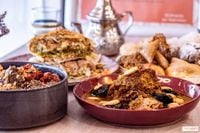Google and X (formerly Twitter) appear to have made significant cuts to their Ramadan 2025 offerings, leaving many users and community members disappointed. For this year’s holy month, Google has removed an illustration featuring a table set for Iftar—a visual that was prominently displayed in searches for "Ramadan" during 2024. Instead, users are greeted by a barren announcement of dates and a simple graphic wishing users a blessed Ramadan in Arabic: "Ramadan Mubarak."
This minimal approach has come under scrutiny, particularly as the desktop version of the search engine has stripped away graphical elements that were added last year. Among these was a visual enhancement placed at the top right and left of the search bar, which no longer exists. On mobile, however, there is a slight innovation; a small tray featuring traditional Ramadan items—dates, a coffee pot, and cup—now appears dynamically in the corner, replacing a blue circle that once led to an interactive animation. This change was noted by several users who took to social media to express their views, with many lamenting the diminished cultural representation.
Meanwhile, on X, hashflags—special hashtags associated with icons—have appeared, but they are identical to those launched in 2024, revealing a lack of fresh engagement with the platform's community during Ramadan. As the month progresses, the end date for Ramadan 2025 is set for Saturday, March 29, determined on the Night of Doubt, further implications of which may create discussions about the observances in diverse communities.
Life in Madrid has been equally challenging for many young migrants observing Ramadan. For Baye Serigne, a 23-year-old Senegalese man without papers, breaking the fast has become a moment of solidarity among peers. He joins friends on Lavapiès square, a vibrant gathering place in the city that mirrors the atmosphere of his homeland. Here, he engages in a daily ritual shaped by friendship and shared struggle, amidst the realities of undocumented life.
On March 24, 2025, Baye and his friends shared coffee and a beef yassa sandwich at a food distribution event organized by a group of Senegalese who have been providing meals during Ramadan since 2018. This yearly event has transformed from a handful of attendees to a notable everyday gathering that serves between 50 and 200 people, depending on the night. Baye relishes these moments, where he feels a sense of belonging far from Dakar, and appreciates the nourishment that not only fills his stomach but also reinforces community bonds.
For many of the attendees, including Assana, who also refrained from sharing his last name, these gatherings offer a reprieve from the daunting challenges of undocumented immigration. Living in Madrid, Assana earns just over 1,000 euros monthly working odd jobs, consistently grappling with the burden of legal papers. He reflects, “For those who have just arrived in Spain, it’s very complicated. They are in centers and don’t have what they need to buy or cook.” The distribution events have become a beacon of hope amidst these troubles, bringing together people who might otherwise remain isolated due to their legal status.
The progress from the program's inception in 2018 to now is marked by a significant increase in participants, illustrating the growing need within the community. In its early days, fewer than 30 individuals were present, a stark contrast to the 400 sandwiches distributed on busy nights today. The sense of shared purpose supports the hope among attendees, who speak openly about their dreams for a future that includes citizenship, job security, and a brighter outlook.
Northern Senegal’s Saint-Louis provides Assana with his memories—a coastal city where he would fish with family. He, like others, ventured through perilous waters to reach Spain, with hopes pinned on the possibility of obtaining regularization. In 2024 alone, a staggering 46,843 migrants arrived at the Canary Islands, highlighting the urgency of such aspirations. Despite the hardships, there remains a collective yearning among the community for a sense of home, autonomy, and acceptance.
The broader context of immigration in Spain is framed by Prime Minister Pedro Sánchez’s approach, which has garnered attention for its optimistic view towards immigrant labor as a remedy to Spain’s aging population and labor shortages. During the country’s economic growth of 3.2% in 2024, the immigration influx, buoyed by tourism and increased population, can be seen as integral to the nation's future. This narrative paints a contrast against the struggles faced by undocumented individuals who are at the mercy of the system yet continue to dream of contributing positively to society.
As Ramadan unfolds, communities both virtually and physically are feeling the impacts of their respective experiences. Whether it’s the disappointment echoed through social media over the lack of cultural engagement from influential platforms or the united front displayed on the streets of Madrid, this month symbolically represents resilience, hope, and the quest for belonging among those who often live in the shadows.





